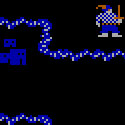|
Real
Roleplaying?
Justin
Hall
Can
computer and video games ever take the place of traditional gamemaster-driven
role-playing games? Justin Hall investigates.
To
most semi-literate gamers, a role-playing game, or RPG, is a party
of adventurers, a fighter/thief/cleric/mage combo, combing dungeon
corners for magic swords and the chattering skeleton king. To Bruce
Runnels, role-playing games offer the chance to play Charles Baudelaire,
a noble pirate from the 17th century who owns a tavern and derides
those without a sense of fashion. In a game he once refused to sleep
with a beautiful courtesan because her corset was two years out
of fashion! (This takes place in Seventh
Sea, a pirate RPG.)
Who
is Bruce Runnels? Well, he works on GRIP,
a dream program for dedicated role-playing gamers who have moved
away from their primary role-playing cohort. Gamemasters purchase
the GRIP program, use the map editor to draw up a map, and add their
own narrative text. Their group of roleplayers downloads the free
client software, and connects to the gamemaster's computer for an
adventure through the Internet. Roleplayers chat together, making
up their adventures in text, as the gamemaster shares narrative,
pictures, and even sounds at the right moments. It sounds great
if you're already a dedicated role-playing gamer.
From what Runnels reports, a healthy community of players
has already grown up around GRIP in the year since its invention.
He says that people have an easier time roleplaying behind a screen
(certainly Sherry
Turkle would agree with him), and users have no problem
making up their own tools and expanding the software. If they provide
all these tools for people to build adventures, would they ever
set up the program so that people could adventure without a gamemaster?
This seems to be crossing the line from “traditional” role-playing
games to computer role-playing games. Runnels was adamant about
the importance of a gamemaster—characters couldn’t propose wild
solutions to problems in the game without a living, breathing moderator
there to develop a story around that tangent.
Suddenly
Massively Multiplayer?
Recently
and without warning, massively multiplayer computer games, such
as Everquest,
Ultima Online,
and Asheron's Call,
have become some of the most popular games today. Thousands of people
connect to these games through the Internet to seek their fortune
in fantasy worlds. But before there were graphically rich worlds
where all the monsters and treasure were spelled out for you, people
used words to make massively multiplayer online worlds — in MUDs,
or Multi-User Domains.
Now Skotos.net
hopes to attract a large audience by offering sophisticated text-based
role-playing environments where people can roleplay and seek their
fortune. In this case, the moderators work in advance to build descriptions
of buildings and non-player characters. Then, they hope, the players
themselves become the plot. You want to be the mayor of San Francisco
during the Gold Rush of 1849? Fine, but you may have to deal with
those in competition for your power.
Lisa Disterheft of Skotos is scripting that San Francisco adventure.
A long time roleplayer, she enjoys Call
of Cthulhu on weekends with her co-workers ("hopefully
without the CEO — I see enough of him as it is"). Once the
game is running, she expects to return to seed the game world with
events, an unexplained murder, or a new vein of gold somewhere,
through the in-game newspapers.
Skotos.net
was at GenCon this year seeking storytellers, people to write the
stories and characters to populate these online worlds. The stories
they have so far are all fantastical, the stuff of pen and paper
RPGs: Lovecraftian horror, fantasy castles, OG,
and Paranoia.
Someday, if all goes according to plan, they hope to have hundreds
of these text games, separated into channels. Pay your monthly small
subscription fee and you'll be able to maintain characters on as
many of them as you can manage.
Old
Man Murray says,
"The plot template for all RPGs is the timeless tale of raising
a little bar higher by doing something over and over again."
Certainly electronic role-playing games trade in on this phenomenon.
We'll have to see if Skotos.net can excite that level of lust in
people without any eye candy.
Beauty
Is in the Eye Candy of the Beholder
If
you're willing to trade in flexible character development and freedom
to use your imagination, you can enjoy a world of vivid graphics
and sounds, with all the trappings of fantasy roleplay. Video game
and computer game designers have been using metaphors from role-playing
games since Alkabeth.
While they offer the opportunity to replay fantasy archetypes, they
haven't often offered storytellers and game masters any tools to
build their own computer fantasy adventures. Electronic Arts' Adventure
Construction Set from 1984 was a notable exception; the
program allowed players to build their own games by using tile graphics
and writing in-game text. Interplay released the Bard's Tale Construction
Set in 1991, and SSI released its own dungeon-making tool Dungeon
Hack, but neither game provided for multiplayer adventuring.
Internet
gaming has inspired game makers to develop tools for gamers who
want to create adventures to share with their friends. Recently,
Vampire the Masquerade: Redemption
was among the first products to combine contemporary gaming graphics
with story-scripting tools. Aspiring game masters can use the game's
characters and locations to build adventures for up to four players
online. Filling up a London nightclub with werewolves and Goth chicks
is easy enough through the click-and-drag menu interface. But if
you want to give the non-player characters text speeches, or certain
behaviors (by instructing them to "give another player a shot
glass of blood"), you have to be able to program in Java. Usually,
that’s above and beyond the abilities of most players. Still, John
Heinecke from Activision reports that Vampire players with programming
savvy have been making tools for a dedicated community of storytellers.
As difficult as the programming may be for Vampire, it still offers
ambitious players/storytellers an outlet for their storytelling
instincts.
SSI's
upcoming Pool of Radiance
II has multiplayer capacities, but the game-mastering
elements have been completely removed. Gathering friends for a game
of Pool of Radiance II means six characters hacking their way through
a randomly loaded dungeon, facing randomly loaded enemies. Why bother?
"Because there are certain items you can only get in the multiplayer
dungeons."
Tradition!
At
GenCon Activision was also showing off Wizards
and Warriors, a game from D.W. Bradley, who worked on
the later Wizardry titles and Dungeon
Master, one of the first graphically rich first-person
dungeon crawls. As I right-clicked to attack a group of skeletons,
I asked the Activision representative, "What kind of game is
this?" "This is a traditional RPG" was the response
I got. By this time I'd been talking to enough traditional roleplayers
to get my dander up — I felt my beard unfurling as I began to speak:
"Just how am I roleplaying? I'm clicking my way through a dungeon!
I can't talk or even type to say anything! I'm just a fighter/rogue/mage/cleric
group trying to gain experience and loot! There's no roleplaying
in this!"
He
was a bit taken aback by my tirade, but he responded, "This
is a nostalgia game, a throwback," and I have to admit that
he’s right. Trolling through a dungeon gaining levels and loot was
something I'd been doing since I was seven when
I first started playing Wizardry. And even the dedicated
role-playing gamers at GenCon were not above this kind of dungeon
adventure. All the people I interviewed for this article had recently
been playing Diablo II
or Icewind Dale.
The other thing that united all the roleplayers, which I spoke with
at GenCon, were their gaming stories, stories that could not have
come out of computer roleplaying today. Bill Dugan of Wizards of
the Coast mentioned a recent pen and paper D&D3
game in which a party of adventurers opened a door to see a large,
enraged Minotaur charging them. One of the players decided that
he'd do the smart thing, so he closed the door. The Minotaur kept
running and tried to knock down the door. The player was able to
hold it up for some time (a few lucky die rolls), but soon the Minotaur
had knocked down the door, flattening the player beneath. Rather
than simply running over the door, the Minotaur (administered by
the dungeon master) stomped on the door until he heard a crunching
sound. Dugan was chuckling as he told me this; he contrasted it
with Final Fantasy VII,
a leading console role-playing game. In that game you can only play
Cloud. ("It's like being an actor, being handed a script.")
I
thought that I could settle the score if I asked the co-originator
of the modern role-playing game, Gary
Gygax, about computer role-playing games. He, in turn,
responded with a question: "To whom are you playing a role?"
With the advent of the Internet, computer games may finally be able
to expand roleplaying beyond self-stimulation into storytelling.
But ultimately, if you want to experience true roleplaying, it looks
like you still have to unplug your mind.
|





